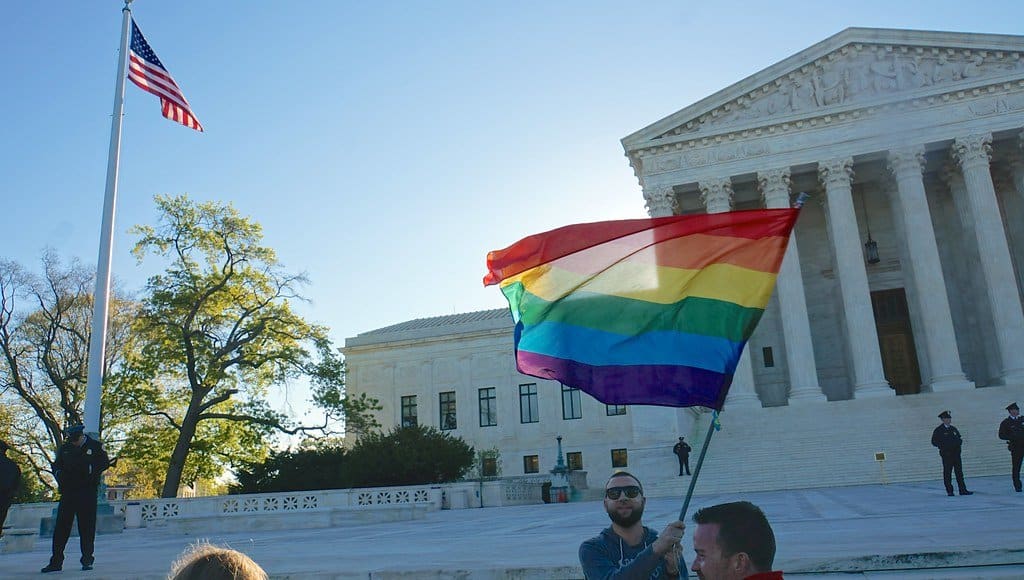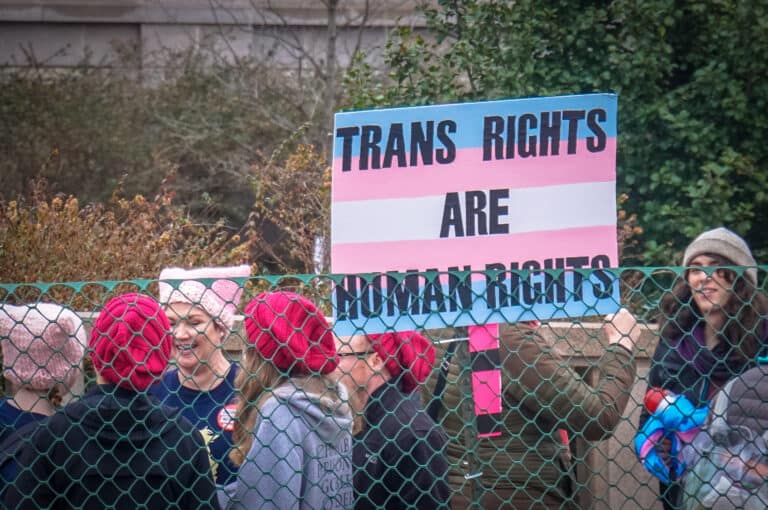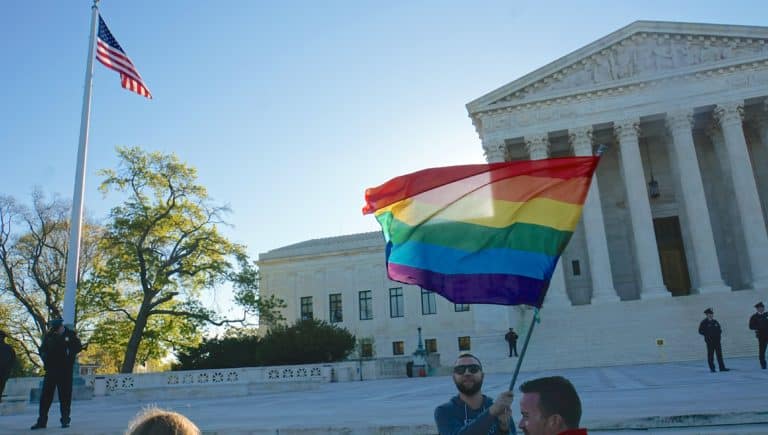On October 8 the Supreme Court will hear oral argument in Bostock v. Clayton County, Altitude Express Inc. v. Zarda, and R.G. & G.R. Harris Funeral Homes Inc. v. Equal Employment Opportunity Commission.
OnLabor previously summarized the opening and amicus briefs submitted in support of the LGBTQ employees here, here, here, here, and here. Today we summarize the opening briefs submitted by the employers.
Opening Briefs of Employers
The briefs from Clayton County, Georgia’s and Altitude Express, Inc. assert that discrimination because of sexual orientation is not discrimination because of sex. They say that when Congress passed Title VII in 1964, the public meaning of the word “sex” referred to male or female, not sexual orientation. No Supreme Court case has interpreted sex in a different way. Oncale, in which the Court said Title VII’s bar against sex discrimination encompassed same-sex harassment, applied rather than abandoned the original public meaning of sex. Harassment of men by a gay male would disadvantage men in the workplace relative to women, just as harassment of women by a straight male would disadvantage women relative to men.
The employers characterize the employees’ three theories (but-for, associational, and sex stereotyping) as unpersuasive. With respect to the but-for theory, the employers explain that proper but-for analysis changes a single variable: the employee’s sex. In contrast, the employees’ but-for analysis alters two variables: the employee’s sex and the employee’s sexual orientation. The employers concede that a Title VII violation occurs when an employer fires a lesbian for being homosexual, but does not fire a gay man. In this situation, sexual orientation remains constant. By comparison, there is no violation when an employer fires a lesbian for dating women, but retains a straight man for doing the same. This is because sexual orientation, not just sex, enters into the equation. Moreover, just because an employer must consider an employee’s sex in order to discriminate based on sexual orientation does not mean the employer discriminates on the basis of sex. Knowledge is distinct from motivation. The employer only takes the adverse action after arriving at a conclusion about the employee’s sexual orientation.
In refuting the employees’ associational discrimination theory, the employers note that Title VII, unlike the Americans with Disabilities Act, does not explicitly deem associational discrimination a type of discrimination within its reach. Accordingly, the Supreme Court has never recognized such a claim under Title VII. Even if Title VII extended to associational discrimination, sexual orientation discrimination would not qualify. The employees’ invocation of Loving v. Virginia is inapt because hostility toward interracial relationships is rooted in white supremacy (which favors one race over another), while hostility toward same-sex relationships is rooted in opposition to homosexuality (which applies equally to all sexes).
The employers further argue that sexual orientation discrimination does not constitute sex stereotyping under Price Waterhouse. First, Price Waterhouse only viewed sex stereotyping as potential evidence of one sex being favored over another. It did not make sex stereotyping actionable as a stand-alone claim. Second, Price Waterhouse only applies to the use of stereotypes particular to a specific sex. An employer who objects to homosexuality typically objects to it in both men and women.
Both briefs emphasize how congressional activity since 1964 reaffirms that Title VII does not bar discrimination against sexual orientation. Time and time again, Congress has failed to enact legislation that would explicitly add sexual orientation to the list of Title VII’s protected categories. Moreover, when Congress passed the Civil Rights Act of 1991, it did not correct EEOC and circuit court decisions holding that Title VII does not cover sexual orientation discrimination, thereby impliedly ratifying them. Finally, Congress has shown it is capable of passing statutes, such as the 2012 renewal of the Violence Against Women Act, with explicit protections based on both sex and sexual orientation when it wants to do so. Rather than viewing the inclusion of both sex and sexual orientation as the product of a “belt and suspenders” approach to ensure sexual orientation was covered, the Court should employ the canon against surplusage to see these statutes as evidence that sex means something distinct from sexual orientation.
A holding in favor of the employers’ position would also not interfere with Title VII’s bar against adverse employment action where sex is a “motivating factor.” The inquiry in mixed-motive analysis is the degree to which an employment action is based on sex, not whether sex informs the type of discrimination involved. The employers further assert that drawing a line between sex and sexual orientation discrimination would not leave lower courts with an unworkable rule. Confusion in the lower courts is the result of judges misreading Price Waterhouse as creating a stand-alone sex stereotyping claim. The remedy for this confusion is clear guidance from the Supreme Court as to Price Waterhouse’s proper meaning.
The briefs from Harris Funeral Homes and the United States argue that discrimination because of transgender identity is not discrimination because of sex. Like Clayton County and Altitude Express, they urge an original public meaning theory of sex discrimination. Under their application of this theory, sex discrimination in 1964 referred to differential treatment because of biological sex. Differential treatment, they say, requires that an employer favors one sex as a class over another sex. Biological sex is a fixed category limited to male and female and based on chromosomes and anatomy. An employer who discriminates because of transgender identity does not violate Title VII because it would take the same adverse action against transgender employees whether assigned male and female at birth.
Refuting caselaw cited by Stephens, they say that the Court’s decisions in Oncale and Newport News fully comport with the original public meaning theory of sex discrimination. While the Congress that passed Title VII may not have been principally concerned with combating same-sex harassment or ensuring that men with dependents are treated the same as women with dependents, both cases constituted sex discrimination because one sex was favored over another.
Harris and the United States also contend that Stephens’s sex stereotyping claim falls flat. The Price Waterhouse plurality did not view sex stereotyping as its own cause of action, but only as potential evidence that one sex was favored over another in violation of Title VII. Because Harris would have terminated individuals assigned as both male and female at birth for failing to comply with its sex-specific dress code, there was no violation here.
Harris’s brief in particular emphasizes how “judicially amending” Title VII to add protections based on transgender identity would have adverse consequences, especially for cisgender women. For one, employers would now face a Hobson’s choice: violate Title VII by barring transgender women access to private women’s facilities, or violate Title VII by subjecting cisgender women to a hostile work environment. Furthermore, jobs properly limited to women by a bona fide occupational qualification would suddenly be available to “men who identify as women,” presenting privacy and safety concerns and reducing opportunities for cisgender women in the workplace. The addition of transgender protections would also infringe on free speech and religious freedom, as the government would compel employers and coworkers to refer to individuals using terminology that goes against their beliefs.










Daily News & Commentary
Start your day with our roundup of the latest labor developments. See all
February 20
An analysis of the Board's decisions since regaining a quorum; 5th Circuit dissent criticizes Wright Line, Thryv.
February 19
Union membership increases slightly; Washington farmworker bill fails to make it out of committee; and unions in Argentina are on strike protesting President Milei’s labor reform bill.
February 18
A ruling against forced labor in CO prisons; business coalition lacks standing to challenge captive audience ban; labor unions to participate in rent strike in MN
February 17
San Francisco teachers’ strike ends; EEOC releases new guidance on telework; NFL must litigate discrimination and retaliation claims.
February 16
BLS releases jobs data; ILO hosts conference on child labor.
February 15
The Office of Personnel Management directs federal agencies to terminate their collective bargaining agreements, and Indian farmworkers engage in a one-day strike to protest a trade deal with the United States.